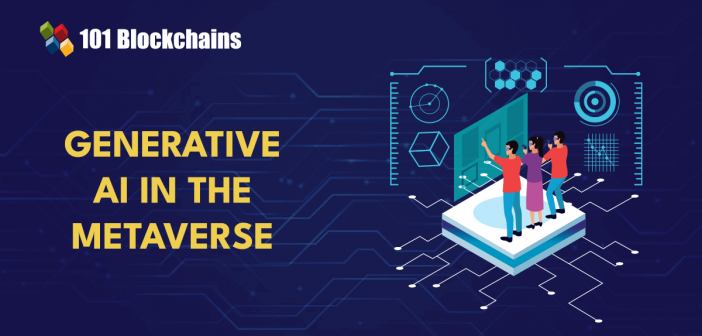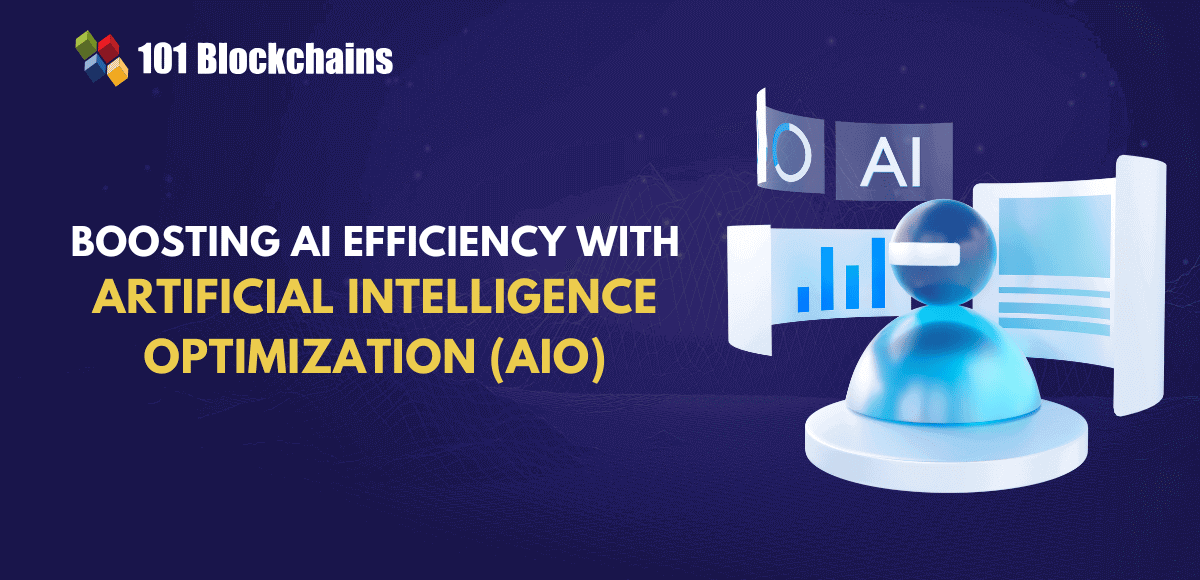Learn how blockchain truly works, master key definitions, and uncover what makes smart contracts so "smart." Dive into the fundamentals, gain valuable insights, and start your blockchain journey today!

- AI & ChatGPT
Georgia Weston
- on December 05, 2023
Generative AI in the Metaverse: Opportunities & Challenges
Generative AI is the most popular form of artificial intelligence you could find in discussions on new technological innovations. It is a type of AI that could support the autonomous generation of new content, such as video, images, audio, and text. Interestingly, the prospects for adoption of generative AI in metaverse have gained considerable levels of attention. Generative AI could provide exclusive and new approaches for generating content in the metaverse.
For example, generative AI tools like ChatGPT could improve the search experiences, reinvent the methods for generating and presenting information, and present new doors for arrival of online traffic. It could influence traditional solutions in the metaverse alongside accelerating innovation in the industry. Let us find out how generative AI could have a major impact on the metaverse.
The Relationship between Generative AI and the Metaverse
You can learn about the impact of generative AI on metaverse by exploring the relationship between the two terms. Metaverse is a virtual universe with a massive collection of immersive digital spaces that allow users to interact with each other. You might think about the role of AI in metaverse and its potential benefits.
It is important to note that usability of the metaverse depends on the effectiveness of the immersive and interactive experiences. The metaverse helps people connect, communicate, and engage with others alongside interacting with content in completely new and innovative ways. Interestingly, the future of metaverse technology is intertwined with innovative developments in AI.
Artificial intelligence could play a crucial role in shaping the future of the metaverse. How? AI is an indispensable tool for the future of metaverse as it offers the ability to enhance user experiences, enabling intelligent interactions and automation of content creation. If you want answers to questions like ‘What is AI metaverse?’ then you must learn about the value of generative AI for the metaverse. Generative AI could help in effective personalization of experiences, creation of dynamic virtual worlds, and generation of realistic virtual content.
It plays a crucial role in enhancing user engagement alongside offering new experiences in the metaverse. For example, generative AI could help in creating new virtual worlds in the metaverse with massive and diverse environments, landscapes, and structures. As a result, generative AI could ensure unique user experiences across the different virtual spaces in the metaverse.
The answers to “How does generative AI affect metaverse?” would also draw attention towards the flexibility for generative personalized characters and avatars in the metaverse. AI algorithms could create unique and realistic virtual avatars with the flexibility to customize appearances, behavior, and traits. The integration of generative AI in the metaverse creates multiple exciting opportunities for users and developers. On the other hand, adoption of generative AI for transforming the metaverse also presents some challenges.
Understand the true potential of generative AI and become an expert with the Generative AI skill path
Transformative Power of Generative AI
The metaverse presents a transformative concept that could blend the components of virtual and physical reality. It opens new opportunities for revisiting the online experiences of users alongside human interactions in digital environments. At the same time, generative AI challenges also create significant concerns for metaverse developers.
Generative AI could serve a major role in development of the metaverse through facility of immersive experiences, personalized interactions, and content generation. The effective integration of generative AI in the metaverse could create new opportunities for the future of entertainment, social interactions, business, and more.
How does the transformative power of generative AI work in the metaverse? The four important aspects in development of the metaverse include text generation, video generation, image generation, and 3D object generation. Generative AI technologies could help in enhancing these four areas to improve the overall experience of users.
Enroll now in the Mastering Generative AI with LLMs Course to discover the different ways of using generative AI models to solve real-world problems.
Automation of Text Generation in Metaverse
The technical use cases with generative AI in metaverse could help in automated text generation for metaverse to improve experiences. Some of the top examples of using generative AI for text generation in the metaverse include content generation, chatbot interactions, language translation, and interactive storytelling. Generative AI could create promising opportunities for immersive, dynamic, and personalized textual interactions in virtual metaverse environments. Here is an outline of the different ways in which generative AI could improve text generation in metaverse.
-
Language Translation
The use of sequence-to-sequence models such as Google Neural Machine Translation could allow real-time language translation in the metaverse. As a result, the role of AI in metaverse clearly points to the ways in which generative AI could enable seamless communication in multiple languages.
-
Chatbot Interactions
Generative AI models like GPT could help in powering automated chatbots in the metaverse, which can facilitate dynamic conversations. In addition, generative AI models could also ensure that chatbots in the metaverse offer contextually relevant answers. For example, virtual assistant chatbots could guide users through the gameplay of metaverse games.
-
Natural Language Interaction
Generative AI models also improve natural language interaction in the metaverse. As a result, generative AI could facilitate realistic and dynamic interactions with the use of AI-based avatars. For example, users could interact with each other in realistic conversations on a virtual social platform in the metaverse.
-
Interactive Storytelling
Interactive storytelling is one of the prominent examples of overcoming generative AI challenges in the metaverse. Generative AI models could utilize narrative generation techniques for facilitating interactive storytelling in the metaverse. The models generate engaging and coherent narratives according to user inputs and specific choices. For instance, the story of virtual role-playing games in the metaverse could depend on the decisions of the player.
-
Personalized Virtual Assistants
The opportunities with generative AI for enhancing the metaverse also point to flexibility for using personalized virtual assistants. For instance, virtual assistants could learn important user preferences and generate recommendations for virtual experiences and assistance for the metaverse journey of users.
Want to learn the best practices for using ChatGPT? Enroll now in the ChatGPT Fundamentals course
Image Generation with Generative AI
The next prominent aspect of the impact of generative AI on the metaverse points to image generation. Generative AI image generation presents promising potential for improving the metaverse with advanced machine learning techniques. The responses to ‘What is AI metaverse’ reflect on the possibilities for using generative AI for developing and enhancing visual content in the metaverse. Here are some of the promising use cases of image generation for metaverse with generative AI.
-
Art Generation
The rise of image-generation AI models such as DALL-E 2 and Midjourney has created multiple prospects for using AI in the metaverse. You can find responses to “How does generative AI affect metaverse?” with the use cases for art generation. Artists could utilize generative AI to create virtual art galleries with artwork that showcases diverse artistic themes and styles.
-
Visual Effects
The use cases of generative artificial intelligence in metaverse also draw attention towards image morphing and visual effects. For example, midjourney can help in generating the transitional steps between specific images, which enables smoother transitions alongside better visual effects. Generative AI could support virtual reality applications through realistic visual effects and image morphing, which enhance the visual impact in the metaverse.
-
Virtual World Creation
Generative AI could also help in creating immersive virtual worlds for the metaverse. You can rely on the applications of generative AI in metaverse for creating realistic images of objects, landscapes, and buildings. The realistic images could help in ensuring that the virtual environments in the metaverse appear realistic.
-
Virtual Fashion
The discussions about ‘what is AI metaverse’ also point to the possibilities for using generative AI in developing virtual fashion. Virtual designers could use generative AI as a promising opportunity for showcasing their virtual fashion lines and accessories in the metaverse. As you can notice, virtual fashion showcases could save loads of resources while providing immersive virtual shopping experiences.
Enroll in our Certified ChatGPT Professional Certification Course to master real-world use cases with hands-on training. Gain practical skills, enhance your AI expertise, and unlock the potential of ChatGPT in various professional settings.
Video Generation Opportunities in Metaverse
Generative AI also opens up new opportunities for the metaverse with the help of video generation capabilities. Metaverse developers can utilize generative AI to create captivating user experiences in videos. Here are some of the most noticeable use cases of generative AI for video generation in the metaverse.
-
Dynamic Video Creation
The role of AI in metaverse for video generation use cases also reflects on generative diverse video content according to user-defined styles and parameters. Interestingly, generative AI models for video generation also support creative storytelling alongside encouraging immersive virtual experiences. For instance, dynamic generation of video content during virtual conferences in the metaverse could enhance the visual appeal and user engagement with the conference.
-
Video Editing and Visual Effects
Generative AI models such as Stable Diffusion could help in generating visually appealing videos with customizable effects and visual elements. Such types of generative AI models could present better opportunities for visual storytelling and content development in the metaverse.
The applications of generative AI in metaverse could help in synthesizing video content by combining multiple elements. On top of it, generative AI applications display synthesized video content with different visual effects and transitions that improve their visual appeal.
-
Virtual Actor Creation
Would you believe that AI could help you create virtual actors? As a matter of fact, research suggests that by 2030, the world will witness a major blockbuster film in which 90% of the work will be done by AI. Interestingly, people are likely to point out the generative AI challenges for metaverse content creation as the setbacks for such development.
However, some popular generative AI models, such as Hour One, could generate realistic-looking virtual actors for films, virtual reality experiences, and games. The virtual actors could also have customizable expressions and appearances. In addition, you can also look for opportunities to improve character animation alongside ensuring the development of interactive virtual environments.
Want to get an in-depth understanding of metaverse concepts? Enroll now in the Metaverse Fundamentals Course
3D Objects with Generative AI in Metaverse
The uses of generative AI for transforming the metaverse also involve examples of using generative AI for generating 3D objects. Some of the notable examples of using generative AI for 3D object generation include,
- 3D modeling and virtual object creation.
- Artistic design and customization.
- 3D object detection.
- 3D object reconstruction and content creation.
What are the Challenges for Generative AI in the Metaverse?
The opportunities for leveraging generative AI to improve experiences in the metaverse show that AI is a powerful entity for improving the experience of users in metaverse. However, it is also important to understand the challenges associated with questions like “What is AI metaverse?” before employing generative AI to transform the metaverse.
The foremost challenge associated with generative AI for the metaverse points to the difficulty of obtaining high-quality training data. Why? It is difficult to obtain high-quality training data in the metaverse as the metaverse environment is unique. Therefore, it is important to develop advanced data collection techniques, use synthetic datasets, or implement data augmentation methods for resolving such issues.
The next prominent addition among generative AI challenges for the metaverse points to realism. Developers have to create immersive experiences through high-fidelity and realistic content for the metaverse. However, you can achieve realism only through advancements in model architectures, unsupervised learning techniques, and training algorithms.
Another prominent challenge with the use of generative AI in metaverse points to content control and moderation. Virtual environments in the metaverse are the ideal platforms for growth of user-generated content, thereby calling for responsible and safe content development. Some of the recommended solutions for safe content generation include the implementation of comprehensive content moderation and filtering systems.
At the same time, you must also look at the ethical challenges of using generative AI to improve the metaverse. The role of AI in metaverse also creates concerns regarding ownership, privacy, and consent. You can find ideal safeguards against such issues by establishing clear regulations, legal frameworks, and ethical guidelines.
Develop expert-level skills in prompt engineering with the Prompt Engineer Career Path
Conclusion
The answers to “How does generative AI affect metaverse?” focused on the good as well as bad sides of generative artificial intelligence. Generative AI helps in improving text-based interactions with the metaverse alongside improving the visual appeal and user experiences with videos and images.
On the other hand, the challenges of generative AI, such as ethical concerns and responsible content generation, also deserve attention of metaverse developers. Interestingly, you can find multiple generative AI models being tailored specially for the metaverse, thereby implying good news for metaverse developers. Find more information on generative AI and the best practices for leveraging it to improve metaverse experiences now.







